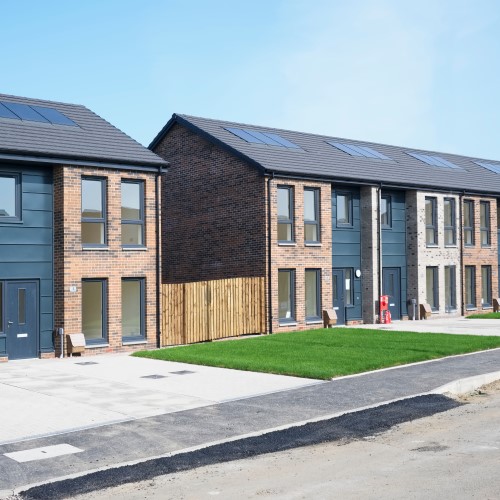What is the First Homes scheme?
The First Homes scheme was launched by the UK government with the aim of creating more affordable homes for first-time buyers.
The properties that are part of the scheme can be bought by first-time buyers for at least 30% less than they’re worth. Some are even 50% less.
That discount makes the first rung on the property ladder much more reachable.
How does the First Homes scheme work?
When a new housing development is being built, the developers can choose some of the homes to be “First Homes”. These are built to be sold for less than their neighbours even though the homes will be exactly the same. In fact, the developers will have to prove that the First Homes they’ve built aren’t of a lower quality.
After the discount is applied, the price of the property can’t be more than £250,000 (£420,000 in Greater London).
First-time buyers can apply to the local authority in the area (ie the council) for one of the First Homes. The local authority might set rules to give preference to people they feel would benefit most from the scheme.
Who can use the First Homes scheme?
Who is more likely to get a First Home?
The above rules apply to everyone.
But local authorities can also set their own rules, which could be things like giving preference to people who already live in the area, people on lower incomes, key workers or people who have served in the armed forces.
The rules that the local authority set are only in place during the first three months after the development opens for applications. After that, if there are still homes available, all first-time buyers who meet the income criteria can apply.
Can I use my lifetime ISA to buy a First Homes scheme property?
Yes! The government will top-up your savings by 25% if you use a lifetime ISA to save for your first home.
How do you find a property that’s part of the First Homes scheme?
Around 1,500 First Homes will be available to buy over the next two years. Currently, the 100 sites that will have First Homes are all in England.
Developers will advertise new homes they’re building that are part of the scheme, so you’ll need to keep an eye out or contact developers to ask. If there are new homes being built somewhere you’d like to live, a quick google should let you know if any of the properties will be part of the First Homes scheme.
If not, ring them and they should be able to give you a clear yes or no.
Sounds good! How do I apply?
- First of all, find out if there are any First Homes being built where you want to live.
- Next you need to know how much a mortgage provider will lend you. You can do this by applying for a “mortgage in principle”.
- If you’re happy you can borrow enough, you’ll need to pay a reservation fee of around £500 to your local authority (they’ll tell you the exact amount). If you don’t manage to get a First Home, you will get this back.
- Apply! You can do this through your local authority.
- If you’re accepted, you’ll be sent an Authority to Proceed and Eligibility certificate. This needs to go to your mortgage advisor and to your conveyancer (solicitor who is helping you buy a home).
- Start planning your house warming.
Most importantly: get started
Got £25 in your current account? If you put it in a lifetime ISA now you'll be taking your first big step towards owning your own home. OneFamily's Lifetime ISA is a stocks and shares product, which means your money is invested in the stock market. While there is good potential for it to therefore grow in the long-term, there is a risk you could lose money.

Articles for first-time buyers
You may also be interested in:
Stocks and shares vs cash lifetime ISAs
There are two types of lifetime ISA: cash and stocks and shares. Find out what the differences are.
How to get on the property ladder
Property is expensive, but it’s not just the home itself you need to think about.
Help to buy ISA vs lifetime ISA
You can transfer your help to buy ISA to a lifetime ISA. Find out if a switch would be right for you.
Lifetime ISA frequently asked questions
Our FAQs break down everything you need to know about lifetime ISAs - including those questions you feel daft asking.
